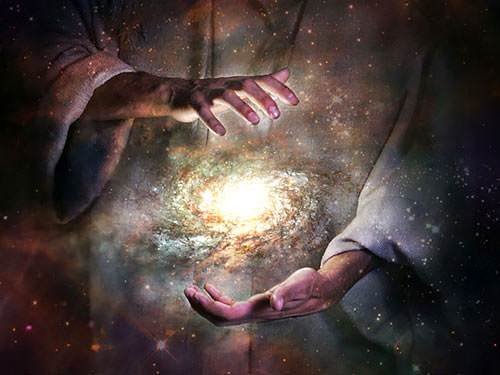The age-old question of “If God created the Universe, who created God?” has been pondered by Christians as well as philosophers and theologians alike for centuries.
While it is impossible to answer this question definitively, there are a few theories that have been proposed in attempts to explain the origin of the divine. In this article, we will explore some of these theories and discuss how they can help us to understand the complexity of the relationship between God and the Universe.
If God created the Universe, who created God?
This is one of the most basic questions of Christianity and one of the most used questions against it. Everything we know has a beginning and an end – why not God?
Logically, this question is a bit difficult to chew and explain. It is logically problematic.
Why? Why doesn’t it make sense?
To say that something/someone created God necessarily implies that something else created that which, in turn, created God. So, we can ask, “what created that other thing?” and so on – and infinitely.
It’s like having an infinite line of dominoes falling one after the other. If you try to go back infinitely in order to locate the first domino that fell and started it all, you will never find it. The reason is that you would have to go through an infinite amount of time to find it – and that is illogical!
However, since the dominoes are falling, there has to be a domino that fell first – so there was SOMETHING that caused that first domino to fall. This is known as causality.
It is literally a philosophical impossibility. The chain of causes or explanations needs to reach a point where it stops. The Christian only says: “Wherever it stops, that is God.”
One could logically deduce that this issue with dominoes means that there is an infinite regress of creators (previous causes) and we could never find what theologians know as “the first uncaused cause” since, by definition, there are no causes. an “uncaused cause.”
This means that the sequence of creations is eternal. But, if it is true that there is an eternal regress of creators, then who created the eternal regress of creators? It is a question that turns and returns to itself.
For this reason, it is better to do it in a definition:
“Everything that begins to exist requires a cause.”
This implies that the thing that began to exist did not previously exist and needs an initial cause. For which we get rid of that infinite regress of domains (or universes, or creators, etc).

So what or who created God?
The Christian position is that God is a self-sufficient Being in absolutely all respects. The arguments in favor of the existence of God they seek is to demonstrate that God is a NECESSARY being. In other words, the universe NECESSARILY had a cause, not PROBABLY. Without the necessary Being, nothing else would exist – that is why he is NECESSARY.
By definition (Psalm 90:2), God was not created; he is eternal. If not, he was not God! For this reason, there is no “special pleading” on the part of Christians. There was never a time when God did not exist, nor will there come a time when He will end. Since God has always existed, he does not need a cause to explain his existence.
Remember that the definition says that “everything that begins to exist requires a cause,” it does not say “everything that already exists requires a cause. At this point, the question “Who/What created God?” it is meaningless.
Simply put: no one created God. His existence is NECESSARY.
From the abstract to the less abstract
Everything we know has a beginning, a beginning of its existence… right?
Of course not.
Think about this: if the world wasn’t created, would 2+2 still be 4? Of course. The laws of mathematics and logic have always existed, so they do not require a cause.
Another example is a circle.

Can you find the corners of a circle?
Can you tell exactly where it starts?
Nope.
Every point inside the circle is equivalent to every other point – so there is no starting point. The circle necessarily has all its points connected to each other; it is what differentiates it from an arch, for example. The circle has no beginning and no end.
Still, it exists.
God has properties that define him in the same way that the circle has properties that define it. A circle cannot have starting or ending points – otherwise, it is no longer a circle. In the same way, God has no beginning and no end – if he did, he would cease to be God. Believing that God did not begin to exist is no more illogical than believing that a circle has neither a beginning nor an end.
As has been shown elsewhere, the only viable explanation for the existence of the universe is that it is the product of a highly intelligent mind, and this mind, identifying itself as God’s, needs no explanation.
In this respect, God is unique. He is the only thing that is self-sustaining in itself. He is the foundation of all goodness, morality, reason, life, and being. He is necessarily so. To ask why it is necessary misses the point – it is a meaningless question.
If God exists, why doesn’t he just show up?

Job said it perfectly:
“If I head east, it’s not there;
If I head west, I can’t find it.
If it’s busy up north, I don’t see it;
if it turns south, I can’t see it.” (Job 23:8-9)
How easy it would be to believe in God if he appeared! How convenient to be able to point to someone specific and say, “See? I told you!”
So why does God hide? Why doesn’t he just show up? Is he after a cheap eye mask of glasses, a plastic nose, and a fake mustache?
The famous atheist Bertrand Russell pointedly said that if he were to meet God face to face when he died, he would demand an explanation of why God made the evidence for His existence so insufficient. It is tempting to think that this is entirely reasonable. However, the evidence we demand of God is likely to be related to what we think about him and his purposes.
Hiding makes no sense if God’s goal is simply to relate to us as an object of knowledge and not with genuine friendship or parental love. If the divine purpose is only to acknowledge that God exists (or only to believe that he exists), then I empathize with Russell’s comment demanding evidence.
However, it has to do with how God wants us to relate to Him. He doesn’t just want us to know He exists – He longs for something more: to glorify Himself through a personal relationship with us. We ask for miracles and signs and displays of his power because, surely, this would prove his existence, right? However, this presents a problem: God doesn’t just want us to know he exists – he wants to glorify himself.
If God made His existence undeniable, then we would be unable to love Him for the right reasons, if we loved Him at all. The great miracles and displays of power would end up being intimidating acts on God’s part; and we would only seek to please him out of fear of his fury, not to seek to have a relationship with him.
In love, there is no fear (1 John 4:18). God loves us, and in order for us to glorify him, we have to love him too. People who argue that Christians believe in God out of fear of hell have a misconception of what it means to be a servant of Christ. Christians who do believe in God for fear of hell miss out on the fullness found in a God who loves them.
Also, given the case that God shows all His power, only a fool would reject the existence of God, right? The problem is that the inability to deny the existence of God would make us puppets. Is it possible to truly love when you are forced to say “I love you”?
The philosopher Soren Kierkegaard described this point in a kind of parable:
“Suppose there was a king who loved a humble servant girl. The king was unique; everyone trembled at his might. No one dared to whisper a word against him, for he had the strength to destroy all who opposed. However, this mighty king loved this servant girl. How could he declare her love for her? In a strange way, his royalty limited him. If he brought her to her palace and crowned her with jewels and royal gowns, he would surely not resist – no one resisted him. But would she love him?
“She would say she loved him, of course, but would she really? If he rode her royal carriage to the shack in the woods where she lives – that would overwhelm her too. The king did not want a servile subject. He wanted a lover, an equal […] because it is only in love that what is unequal becomes equal.”
Of course, this is not to say that God needs our love – God is still God even if no one in the world loved him. But, He has decided to love us – to strip himself of his glory to draw closer to us. He has sought us out in order to enter into a relationship with Him.
This means that God does not remain hidden, but that He has revealed Himself in a forceful, real, explicit way.
How?
The Creation – Romans 1:20 tells us that “[…] his invisible things, his eternal power, and deity, are clearly visible from the creation of the world, being understood through the things made […]”
Jesus – “And that Word was made flesh, and dwelt among us (and we saw his glory, glory as of the only begotten from the Father), full of grace and truth.” (John 1:14)
Beauty and music – In part of his Argument from Desire for the Existence of God, CS Lewis argues that our earthly joys (such as beauty, music, etc.) are not ends in themselves, and thus never leave us. completely satisfied and always looking for more of these things. That is why our states of unfulfilled desires point us to Someone who can satisfy them. Think about it: if the universe is the result of a blind and mechanical accident, why is it so beautiful? Where did it come from? If we are mere “survival machines” and our purpose is nothing more than to reproduce ourselves, why can we appreciate art, music, and the beauty that can be discovered within a mathematical equation or in the structure of a DNA?
READ MORE:
- Unveiling Mysteries In God`s Words
- Faith come by hearing the word of God
- 5 Ways to build your faith in God
Ultimately, God does not hide. He makes his presence known to him so that we can fall more and more in love with him. He longs for us to glorify him, adore him, and love him – not out of fear, but out of love – because he first loved us.
“For the eyes of the Lord look upon all the earth, to show his power in favor of those who have a perfect heart toward him.” (2 Chronicles 16:9)
